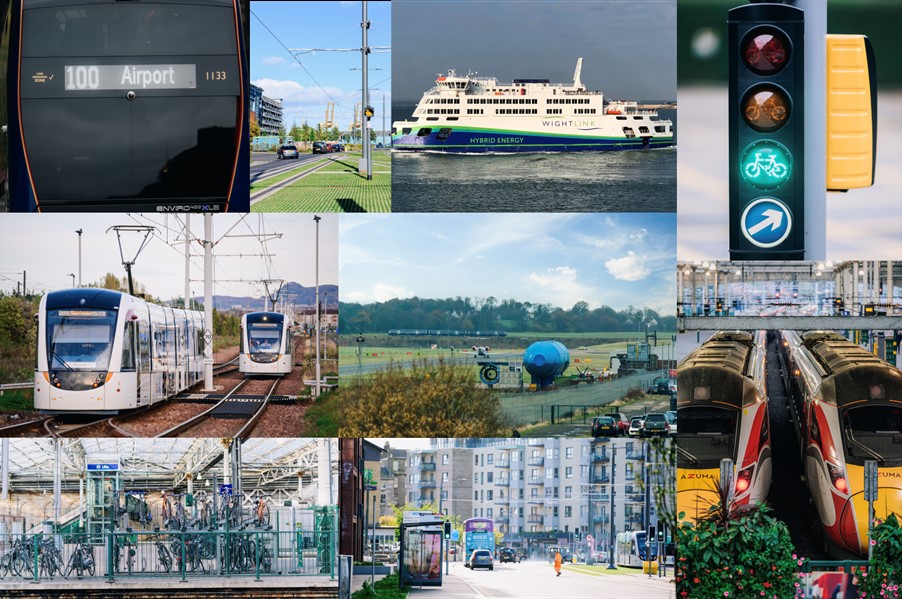Twinning for Decarbonising Transport
Background
Twinning for Decarbonising Transport (TransiT) is a UK-wide research hub established in 2Q 2023 dedicated to digital twinning for transport decarbonisation. The hub’s programme has two phases. The first phase – stakeholder consultation and development of a plan for a research programme – is nearing completion. The second phase – operation of a Research Hub – is planned to initiate in 2Q 2024.

Phase 1 – Stakeholder Consultation
In 2023, Heriot-Watt University, together with University of Glasgow, gathered input from stakeholders across the UK to identify transport and digital technology priorities with the aim of radically accelerating transport decarbonisation. Representatives from these transport and related sectors have assisted in the consultation: passenger and freight transport (across road, rail, maritime, aviation); retail; transport operations; policy and government; charities and third sector; data; cybersecurity; artificial intelligence; telecommunications; energy.
Following reviews of documentation and initial interviews with key stakeholders, TransiT team members held a series of themed focus groups to discuss key challenges with a selection of specialist stakeholders from a variety of sectors and backgrounds.
Themes and issues that TransiT focus groups addressed:
Breaking down silos to reach the outcomes we need
(Group co-hosted by the Infrastructure Client Group)
Many elements of transport, particularly decarbonisation, require solutions that cross the boundaries between modes. How do we ensure new digital systems are practical and suitable across different modes and geographical areas? What information needs to be exchanged to achieve success?
Finance, risk and uncertainty management
(Group co-hosted by the Green Finance Institute)
There are many elements of risk in transport decarbonisation, including uncertainty about government policy, the risk in backing the right technology, return on investment risk for financing projects. Digital capabilities, such as demand modelling or data on consumer behaviour, have been mentioned as possible mitigations for this risk. How can these and other digital capabilities be developed to reduce uncertainty in transport decarbonisation?
Consumer behaviour and attitudes
(Group co-hosted by the Road Haulage Association)
Achieving net zero by 2050 is equally as reliant on behavioural change as it is on infrastructural change. There must be a willingness from consumers to pay a premium for green services and goods. What actions and incentives can effect behavioural change? How can digital capabilities support these? And what must businesses do to incorporate changes to reduce emissions that will satisfy future regulation as well as market demand?
Energy supply and infrastructure
(Group co-hosted by UK Power Networks)
Different energy types are needed for different transport modes and technologies. Energy suppliers will need to know what energy type is required and where changes to infrastructure – such as overhead power supplies, EV charging ports, electric and hydrogen supplies – need to be deployed. What role will digital capabilities and digital twins have in transforming energy infrastructure to achieve transport decarbonisation targets?
Addressing the digital skills gap
(Group co-hosted by the Road Haulage Association)
New technologies, fuels and digital twins will require people with the right skills to manage them. Organisations will need to be able to interpret data to make decisions and investments. How can we ensure that skills and training keep pace with emerging technologies?
Data, sensing systems and IoT
(Group co-hosted by Siemens Mobility – Rail)
Many transport modes exist at differing levels of digital capacity and maturity. When discussing digitising assets and IoT (Internet of Things) during our consultation interviews, we have heard many organisations express concern over issues relating to data quality, privacy and security. What are the barriers that contribute to delays in digitisation by different transport modes? How can these be overcome?
Resilience and maintenance
(Group co-hosted by the Connected Places Catapult)
The end goal for digital twins involves situational data being received and forecasting and decision-making all happening in real-time. But achieving this for every asset and infrastructure will involve significant investment by the transport sectors. How do we overcome hesitance by stakeholders due to uncertainty? What would provide more confidence and clarity to support transport providers? Are there interim steps that can be taken to ease the decarbonisation journey?
Transitional arrangements
(Group co-hosted by the Connected Places Catapult)
As we transition toward a net zero transport system, we have to ensure that the transport system operates in a reliable, safe, and affordable manner. The transition will involve investing in new infrastructure and energy solutions, and upskilling in emerging technologies. All of this will require a clear roadmap. What steps are required to make transition towards a net zero transport system well-managed and equitable?
Workshops with stakeholders
TransiT assimilated the information from the documentation review, interviews and focus groups in order to construct three workshops with high-level stakeholders that explored these questions:
- How can we decarbonise in the next five years?
- Where is the friction that stands in the way of decarbonisation?
These were highly participative workshops held in London (October 2023) and in Edinburgh and in Swansea (November 2023).
The information gathered from across the whole Phase 1 consultation is informing how the research hub in Phase 2 can best be structured to harness the potential of digital twins – sophisticated computer simulations of real-life physical objects, processes or systems – for achieving reduction of carbon emissions from all forms of transport.
Phase 2 – Research Hub
In 2Q of 2024, a 5-year research hub will be initiated. Its longer-term aim is to create a federated digital twin that addresses the urgent need to decarbonise transport, which is still the biggest single emitter of carbon in the UK.
Transit Project Leads
Professor Phil Greening, Heriot-Watt University
Professor David Flynn, University of Glasgow
TransiT Team Members
Funding
EPSRC
